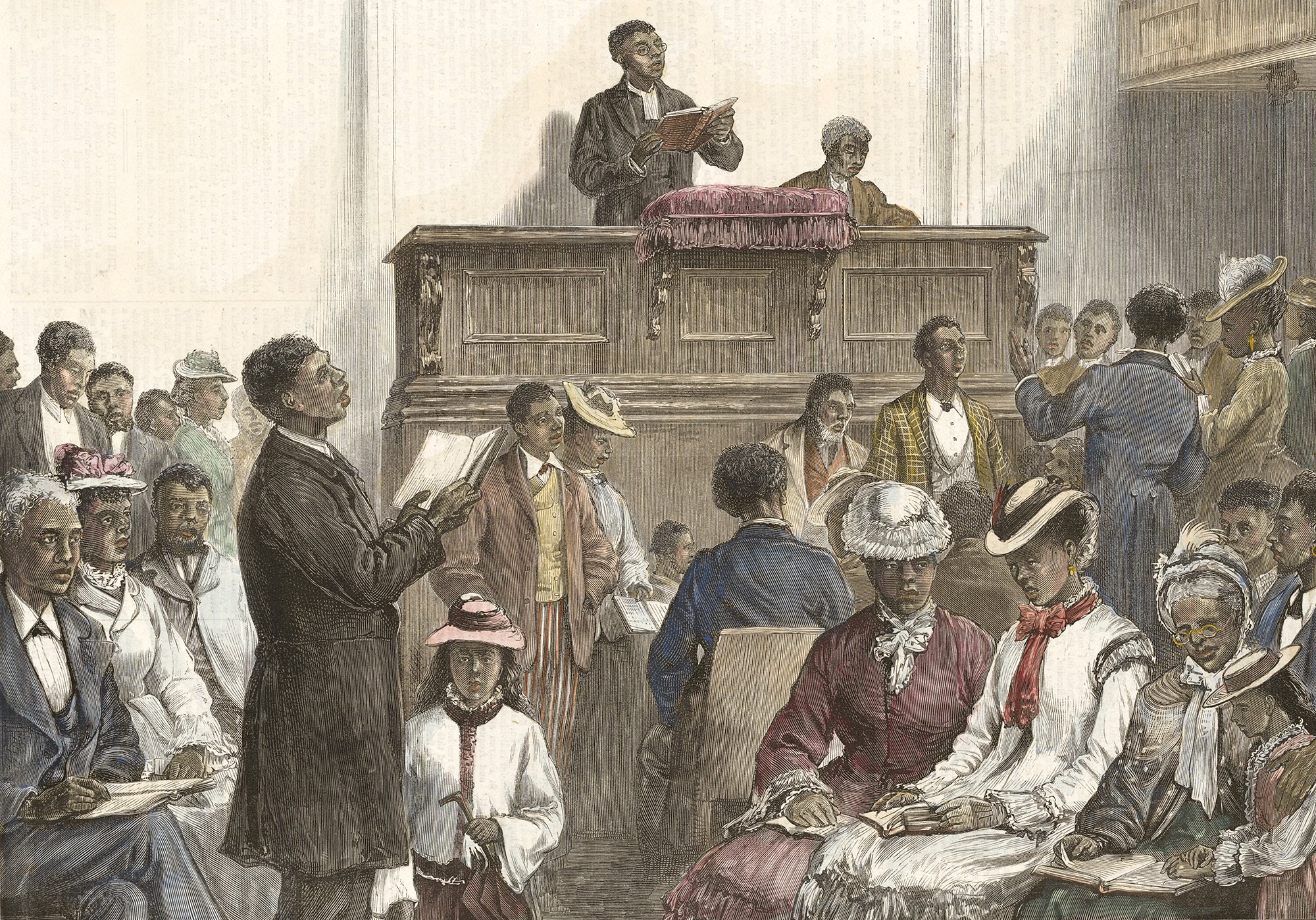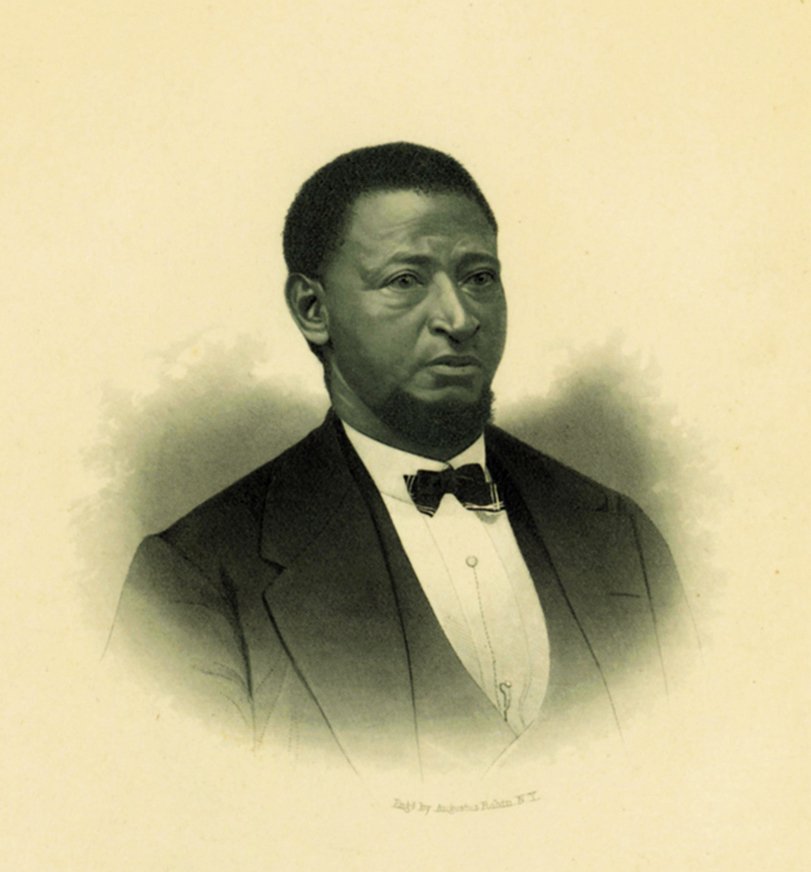
Iowa
Reconstruction Vignette
| We ask that the word “white” be stricken from the Constitution of our State; that the organic law of our State shall give to suffrage irrevocable guarantees that shall know of no distinction at the polls on account of color; and in this we simply ask that the “two streams of loyal blood which it took to conquer one, mad with treason,” shall not be separated at the ballot-box; that he who can be trusted with an army musket, which makes victory and protects the nation, shall also be trusted with that boon of American liberty, the ballot, to express a preference for his rulers and his laws. |
Alexander Clark (1826-1891)
Source: State Historical Society of Iowa
Barber and lawyer Alexander Clark, the son of two formerly enslaved people, spoke these words at a Colored Convention in Des Moines, Iowa, in February of 1868. He successfully appealed to the state legislature and voters to amend Iowa’s constitution, removing the word “white” from its voting laws. That same year, Clark sued the Muscatine Board of Education for denying his daughter admission to a white-only school and won his case in the Iowa Supreme Court, which declared school segregation unconstitutional.
Source: State Historical Society of Iowa
Iowa
Standards Overview
Coverage of Reconstruction: Nonexistent
ZEP Standards Rubric Score: 0 out of 10
The coverage of Reconstruction in Iowa’s standards is effectively nonexistent. The Iowa Department of Education adopted the current core standards for social studies in 2017. Iowa is a local-control state, so the state standards are broad and not chronologically oriented.
Standards mention Reconstruction briefly as a topic covered in the high school U.S. history course. One standard notes that students should “Analyze how diverse ideologies impacted political and social institutions during eras such as Reconstruction, the Progressive Era, and the Civil Rights Movement.” The only other mention of the topic is a brief reference to the Reconstruction Amendments alongside other “primary and secondary sources.”
Because Iowa’s standards provide so little information about whether and how districts and schools should teach Reconstruction, we chose to investigate curricula at the district level. The Local Snapshot below is not meant as a judgment of these districts’ approach to Reconstruction. They were chosen largely at random and are not factored into the grade the state standards receive. The brief analysis of district-level curricula that follows is intended to simply provide a snapshot into how state standards, or lack thereof, can shape Reconstruction pedagogy in the classroom.
Local Snapshot
Though the state standards cover Reconstruction in its suggested high school U.S. history course, most of the districts we analyzed covered the topic more extensively in their grade 8 American History course.
Cedar Rapids Community School District
Grade 8
This course devotes a whole unit to Reconstruction, separate from its “Slavery & the Civil War” unit.
High School
The U.S. History course, while ostensibly covering “the period from reconstruction to the present,” is officially titled “United States History Since 1877,” suggesting that Reconstruction is not a core part of the curriculum.
Iowa City Community School District
Grade 8
The American History course covers Reconstruction and the Civil War in the same unit. Students are expected to be able to “explain how the country attempted to pull itself back together after the Civil War, and how it benefited from the onslaught of social industrial, economic, and technological change.”
Des Moines Public Schools District
Grade 8
In the American History course, Reconstruction is the final unit and receives four weeks of attention. The curriculum takes a broad approach to the topic with a focus on national political events, asking students to “Critique the plans for Reconstruction” and “Assess the impact of Reconstruction.” More specifically, the curriculum mentions challenges to Reconstruction, Black voting, the Freedmen’s Bureau, Black Codes, and the KKK. It also asks students to assess Reconstruction’s “enduring impact.” The curriculum contains links to extensive outside resources, including the Zinn Education Project, Facing History, and other interactive and primary sources.
Educator Experiences
Teachers who responded to our survey emphasized that the local-control approach in Iowa allowed them to focus on Reconstruction if they chose to do so. Amy Morgan, a high school teacher from Burlington, explained that “I feel we cover the rise of racism, discrimination, and bigotry well and how it all plays into the Reconstruction Era and beyond.” Denny McCabe, a retired middle school teacher from Waterloo, noted that the main obstacle to teaching Reconstruction was “the lack of time to do justice to such a complicated era.”
High school social studies teacher Lee R. White of Winthrop expressed concern that “the political climate of the conservatives pushing back against teaching anything negative about our history” threatens to reduce coverage of Reconstruction. Denny McCabe noted that these efforts could exert a “chilling effect on current teachers who need to teach about white supremacy and racism in order to do justice to the topic.”
Assessment
Iowa’s Reconstruction standards are effectively nonexistent. It appears that because Reconstruction receives so little attention in the state standards, Iowa’s school districts have not prioritized the topic in their curricula. Notably, though the state standards situate Reconstruction as part of the middle school curriculum, the districts we surveyed covered it in high school. Districts like Des Moines offer a good example of Reconstruction coverage, but the lack of specific state standards increases the probability that coverage of Reconstruction will vary wildly by district and by teacher.
Without guidance around key Reconstruction-era history, many students will not learn about the intensification of white supremacy, the Black Codes, the KKK, debates over who would control land and labor, and Black agency and political organizing. Teaching Reconstruction effectively requires centering Black people’s struggles to redefine freedom and equality and gain control of their own land and labor during and after the Civil War. Any discussion of Reconstruction must also grapple with the role of white supremacist terrorism in the defeat of Reconstruction and the negative and positive legacies of the era that persist to this day.
In June 2021, Gov. Kim Reynolds signed into law HF802, a bill that bans teaching about systemic racism and sexism. In particular, teachers may not educate students on “fault, blame, or bias” related to racism or sexism, “consciously or unconsciously.” In 2023, a bill mandating the department of education develop a website through which students and parents would report violations failed to pass. Several respondents to our survey expressed concern about the possible chilling effects on classroom education that such measures can have around the country, particularly on discussions of the history and legacies of Reconstruction.
